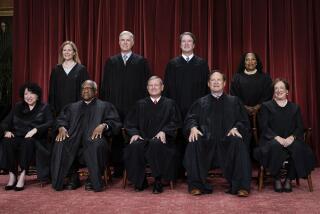Bush Cabinet Ties Official, Personal Trips : Ethics: A Times survey finds no evidence that department heads travel at taxpayer expense for purely private reasons.
- Share via
WASHINGTON — Since assuming her new duties as secretary of labor three months ago, former Illinois Rep. Lynn Martin has made at least three weekend trips entirely at government expense to Chicago where her husband lives.
Although the trips were arranged primarily to conduct official business in Chicago on Fridays and Mondays, Martin’s aides acknowledge that she took advantage of the visits to spend Saturdays and Sundays with her husband, U.S. District Judge Harry Leineweber.
Martin is by no means the only member of President Bush’s Cabinet who exploits official travel for personal--or political--purposes. A Times survey of travel records of top Cabinet officials found that the taxpayer often foots all or most of the bill for trips by top Bush appointees that are not entirely devoted to official business.
Nevertheless, while they frequently piggyback personal, political and official travel, there is no evidence so far that Cabinet secretaries routinely travel at government expense for purely personal reasons--as White House Chief of Staff John H. Sununu is accused of doing.
Under law, federal employees must reimburse the government for any personal costs incurred during an official trip. The government also must be reimbursed for any part of an official trip by a Cabinet member that involves a political event.
But there is no law preventing top Administraton officials from scheduling their official travel to locations where they also have personal or political interests. Thus, Martin and others are acting entirely within the law when they add personal and political stops to their official travel schedules--sometimes without repaying the government.
In fact, during the 1990 congressional elections, top Cabinet officers were strongly encouraged by Bush’s political advisers to arrange political appearances on behalf of Republican candidates whenever they visited a city at government expense.
Some Cabinet members recall that David M. Carney, director of the White House Office of Political Affairs, supplied them with lists of congressional districts that they were expected to visit during the last election season to help call attention to Republican candidates.
“Whenever we were going to be in one of those districts, we’d call the Republican candidate and ask if the secretary could be of some help,” said Steven Goldstein, spokesman for Interior Secretary Manuel Lujan Jr.
In these cases, the government was reimbursed for part of the travel expenses by the candidate or a Republican Party organization. But the reimbursement was often only a fraction of the total cost of the trip.
For example, Lujan attended a Republican Party event while he was in Natchez, Miss., last June attending the dedication of a new historical site by the National Park Service. The Republican National Committee paid $47 toward the $445 airplane ticket purchased for him by the government.
Travel records provided to The Times by Lujan, Martin, Secretary of State James A. Baker III, Treasury Secretary Nicholas F. Brady, Housing and Urban Development Secretary Jack Kemp, Transportation Secretary Samuel K. Skinner, Commerce Secretary Robert A. Mosbacher and Veterans Affairs Department Secretary Edward J. Derwinski show that these officials often combine either politics or personal business with their official travel.
Baker--unlike other Cabinet officers--always flies aboard government aircraft for security reasons, no matter what the purpose of the trip. But he and his family members routinely reimburse the government for personal trips, one of which cost nearly $4,000.
While other Cabinet officers do not always use government aircraft, they usually reimburse the government for whatever parts of their official trips are deemed by them to be personal or political.
But their reimbursement policies vary widely, especially when it comes to drawing a line between official and unofficial travel. The records show that Cabinet officers often use government travel to subsidize their busy social or political travel schedules.
During her 10 years in Congress, Martin routinely traveled home to Illinois on weekends at the expense of the government, which provides a generous travel allowance for members of Congress to return to their home districts. But now that she is a Cabinet officer, Martin is not permitted to spend government money for strictly personal travel to Chicago.
Martin’s travel records show that she made one official trip to Chicago in March and two official trips in April--all three of them spanning a weekend. These three trips were paid for by the government. In addition, she stopped in Chicago after attending a GOP event in Lincoln, Neb.--a trip paid entirely by the Nebraska Republican Party.
The government paid $1,200 for two of her official trips between Washington and Chicago, and $1,764 for a third trip to Chicago that included stops in Kansas City, Oconomowoc, Wis., and Rockford, Ill.
Johanna Schneider, Martin’s spokeswoman, said the labor secretary’s official trips to Chicago were scheduled around the weekends primarily because her work requires her to stay in Washington on Tuesdays, Wednesdays and Thursdays. She also emphasized that Martin paid her own way back to Chicago on three other occasions and that she does not charge the government for her lodging in Chicago during official visits.
Like Martin, the two other Chicago natives on Bush’s Cabinet--Skinner and Derwinski--also make frequent official trips to their hometown, often on weekends. But neither of them still maintains a home in Chicago, so their lodging is paid for by the government.
Skinner, who often travels aboard a plane provided for his use by the Federal Aviation Administration, which is part of the Transportation Department, has returned to Chicago at least 15 times at government expense since becoming transportation secretary.
Derwinski’s travel records demonstrate how Cabinet secretaries can define for themselves what constitutes official and personal travel.
His official itinerary included 27 stops in Chicago--or about one a month during his tenure as veterans affairs secretary--many of them for events that appeared to be primarily personal. For example, he flew back to Chicago last month at government expense primarily to attend a private reception in his honor hosted by a local couple, Matt and Rose Lamb.
Dennis Boxx, a Veterans Affairs Department spokesman, said that Derwinski, Skinner and Martin are often invited back to their hometown for public and private appearances because the people there “are very proud of the number of senior people who are in the Administration from Chicago.” He added that Derwinski “has a soft spot in his heart for Chicago.”
Under other circumstances, Cabinet secretaries sometimes reimburse the government for portions of their official trips devoted primarily to personal activities.
After touring the Northeast last March aboard a government-chartered plane, Brady took the plane to Easton, Md., where he spent the weekend. He reimbursed the government $100 for the flight to Easton. The Treasury Department did not disclose how much the government paid for the charter.
Kemp’s travel records show that he is especially popular on the political circuit. During the 1990 elections, he made appearances on behalf of at least 27 congressional candidates around the country and many of these stops were part of official trips.
Mosbacher’s travel included about 30 flights aboard corporate or private airplanes, most of them provided to him by big Republican contributors. His spokesman, Gary Foster, said the companies were reimbursed by the Republican Party whenever the trips included political events. Private corporations are forbidden by law from making political contributions.
More to Read
Get the L.A. Times Politics newsletter
Deeply reported insights into legislation, politics and policy from Sacramento, Washington and beyond. In your inbox twice per week.
You may occasionally receive promotional content from the Los Angeles Times.










